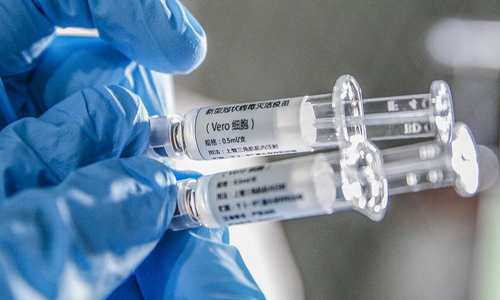COVID-19 vaccines offered to SOE overseas workers proven safe
By GT staff reporters Source:Global Times Published: 2020/6/11 15:38:40

A staff member displays samples of the COVID-19 inactivated vaccine at Sinovac Biotech Ltd., in Beijing, capital of China, March 16, 2020. (Xinhua/Zhang Yuwei)
Employees of state-owned enterprises (SOEs) preparing to go abroad are offered to administer two choices of homegrown inactivated vaccine shots for urgent use, with both shots having demonstrated safety in human trials. Experts speculate that workers traveling to high-risk areas such as the US, Brazil and India will be given priority for vaccination.
The vaccination offer serves not only to protect Chinese overseas from infection but also to help provide more valuable data to help detect antibody levels and calculate vaccine protection rates for a global reference to the vaccine's efficacy, analysts suggested.
The two vaccines for urgent use are developed by Beijing Biological Products Institute and Wuhan Institute of Biological Products, both affiliated to China National Pharmaceutical Group (Sinopharm). Both are inactivated vaccines that have shown safe results with no distinct adverse reaction during the first two phases of clinical trials, according to a written notice of the vaccine offer relayed to the SOEs obtained by the Global Times.
"According to the feedback given by Sinopharm, the two vaccines have been verified to be safe through clinical trials and are now going to the phase III clinical trial," the notice said. "All procedures are undergoing with relevant national laws and regulations."
Sinopharm said on May 29 that clinical data from more than 2,000 cases of the two inactivated vaccines showed that the safety and immunoreactions of the vaccine have been fully verified, with no obvious adverse reactions.
The resumption of production of overseas projects and the health of overseas workers are still under serious threat. For better prevention and quicker recovery of Belt and Road Initiative (BRI) projects, Sinopharm has given priority to supporting workers intending to go overseas to vaccinate for urgent needs, the notice said.
An employee in charge of publicity at a Chinese railway construction company confirmed the notice with the Global Times on Thursday. The company has construction projects along the BRI in Asian, African, Oceanic and American countries such as Nepal, Fiji and Ecuador.
"There is such a notice, but it will take time before the vaccines could be distributed to our company," the employee said. "Also it has not been officially published in our department, so we have yet not known any details."
Another SOE dedicated to BRI infrastructure construction projects also confirmed this proposal to the Global Times on Thursday, telling the vaccination offer is their cooperative plan with Sinopharm. The specific arrangement is still confidential.
Vaccination priority will be given to SOE workers carrying out overseas business regularly or for a longer time. Those who have temporary travel plans can also be provided depending on their demand, according to the notice.
"The vaccination is completely voluntary. Informed consent must be signed prior to vaccination and the second dose should be administered within 14-28 days after the completion of the first dose," the notice said. "In special emergency situations, a one-time two-dose regimen is also accepted though the durable antibody response is relatively weak, as indicated by the available data."
Sinopharm has not responded to the Global Times' interview request on its offer to SOE employees as of press time.
A COVID-19 vaccine could be ready for emergency use by September, said Chinese Center for Disease Control and Prevention Director Gao Fu on April 23.
China still faces the risk of a second round of the COVID-19 epidemic, said a recent report led by Gao. A safe and effective vaccine is expected to be the most powerful tool to contain the disease and stop local transmission by forming a population immunity barrier.
"The offering dose for emergency use is very important, considering how the data captured from it is valuable to observe the efficacy of vaccines especially in high-infectious areas," Tao Lina, a Shanghai-based vaccine expert, told the Global Times on Thursady. "The proposal also reflects how the Chinese government values the right to life and health of overseas citizens."
Predictably, some of the overseas workers who were consulted chose to be vaccinated and some did not, thus forming a vaccine group and a control group naturally for researchers to better obtain vaccine protection rates based on their respective infective rates after one to two months, said Tao.
"Since overseas workers are exposed to greater risks, the resulting data will be more critical and, if published globally, valuable to global researchers," he added. "But both vaccinated and unvaccinated overseas workers should be kept under medical observations and emergency rescues measures need to be prepared."
Chinese scientists have made great progress in their research into novel coronavirus vaccines, as at least six vaccine candidates have entered clinical trials, according to WHO data updated on Tuesday.
The Beijing Vaccine & Serum Institute has completed construction of the world's largest inactivated COVID-19 vaccine production facility capable of manufacturing more than 3 million doses, with an annual output of 100-120 million doses after mass production is achieved, the Xinhua News Agency reported.
The report also said that the inactivated vaccine facility developed by the Wuhan Institute of Biological Products is set for completion within the next month. By then, China's two biological research institutes will have an annual capacity of more than 200 million doses to ensure the accessibility of the inactivated COVID-19 vaccine.
With the daily number of new cases in China already very low, the vaccine will need to be further tested overseas where the outbreak has not subsided. It is reported that some countries including the UK, Canada and Malaysia have indicated their willingness to work with China in vaccine research and development.
Posted in: SOCIETY